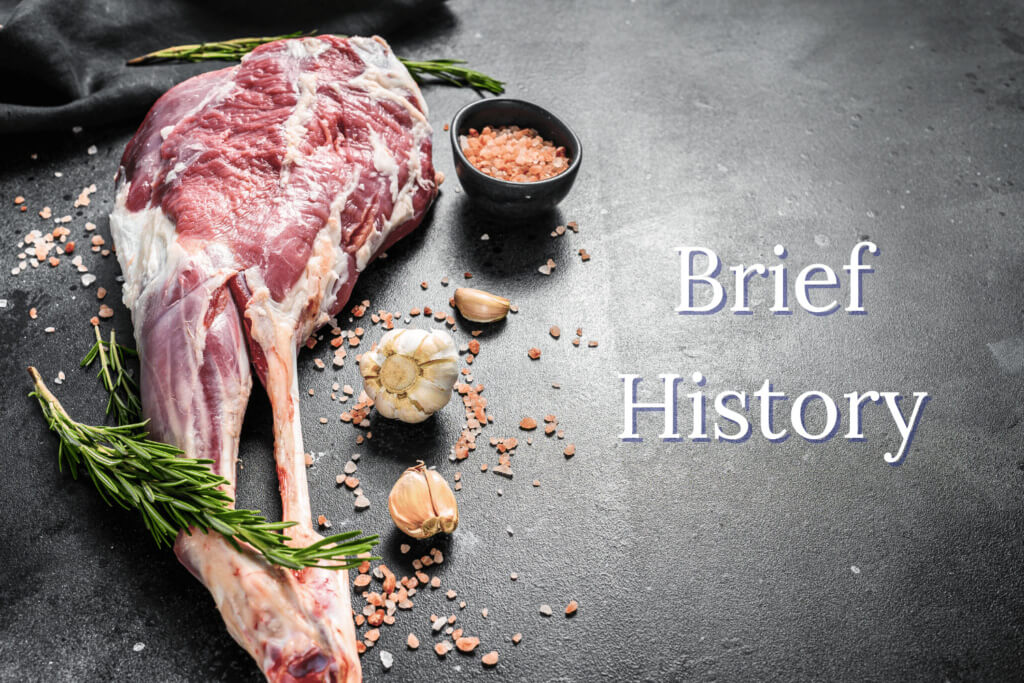The consumption of meat represents an interesting period in our history.
It is believed that consuming meat significantly contributed to our ancestor’s development, causing them to evolve bigger brains and smaller guts, which made us more efficient problem solvers.
While scientists debate the extent that meat consumption caused an evolutionary shift, there is no denying the rich nutrition meat provided and the energy it saved our ancestors.
The earliest record of meat consumption
The earliest evidence of humans consuming meat dates back more than 2.6 million years ago with some findings going back even further. It was around this time that Homo habilis—our earliest known ancestor—began to consume animal flesh on a regular basis. This marked a major shift in diet from the plant-based food that our ancient human predecessors had previously relied upon for sustenance.
What sparked the change?
The answer is simple: the invention of stone tools.
Neither modern humans nor our ancestors had sharp teeth capable of tearing through flesh in the way that predators do. Hunting and eating raw meat was therefore difficult and infeasible until we developed sharp stone tools.
Once we created sharp-edged tools we were able to scavenge meat from animals by removing the meat from carcases that were abandoned and we sliced the meat into smaller chewable sizes. The evidence for this came from animal fossils with markings on their bones that could have only come from stone tools.
Many of those fossils also had teeth marks from predatory animals, which indicates that the prey’s meat was eaten by both our ancestors and the predator. It is likely that the predatory animal was responsible for killing the animal because they were better equipped to hunt than our ancestors, who only developed hunting tools like spears around 500,000 years ago. This is close to the period we began cooking food, but both of these practices are much later than our earliest indicators for meat consumption.
The conclusion is that we used tools to cut meat long before we enhanced them to hunt.
Why did we begin eating meat?
There is only one logical answer: nutrition.
Meat is more energy dense than plant-based foods and it contains far more nutrients, including omega-3, zinc, iodine, iron, vitamin B12, fat-soluble vitamins (A, D, K, E), and amino acids that are not present in plants.
The extra calories and nutrition meant that humans had better fuel for their brains, which scientists believe enhanced our overall development. The extra fuel meant that we spent less time searching for food and were better able to focus on problem-solving, which helped us progress.
There is another less obvious, but equally important reason that our ancestors consumed meat: it is more energy efficient to eat. Chewing requires force and consumes energy. The modern diet isn’t particularly arduous, but our ancestors were eating a lot of plants and their roots, which are particularly difficult, and the energy they provide is not significant considering the effort and amount one must go through just to consume them.
Meat requires 35-40% less force to chew than roots. It is estimated that a diet reliant entirely on roots would require 15 million chew cycles each year, which took time and wore down teeth. Eating meat could reduce this to 2 million because of its softer texture, and the energy yield of meat is considerably higher, ironically it’s a no-brainer.
Smaller, energy-dense meals caused us to evolve with smaller intestinal tracts because we didn’t need to process the large volume of fibrous materials. We, therefore, had more fuel for our brains to develop problem-solving, social and language skills, which really supported our progression.
Availability of meat
Hunting for meat is of course more difficult than foraging for plants and roots. After all, plants don’t tend to run away. But, scavenging meat from abandoned carcases or chasing away smaller predators with a large group or tribe was nutritionally profitable.
Recent studies tested the amount of zebra meat left behind on carcases abandoned by lions in the Ol Pejeta Conservancy in Kenya. It turns out that there is a lot. More than 95% of the bones still had meat on them, with 50% containing a significant amount. On average, each zebra provided around 15 kgs of scrap meat.
This would provide a lot of nutrition for a small tribe. Consider an estimate of four calories per gram of meat, this would yield 60,000 calories, which is equivalent to 107 Big Macs, which is enough to meet the caloric needs of 27 adult males.
You can see why our ancestors opted for ‘fast food’ over static plants.
The modern diet
While eating meat is believed to have made a significant contribution to human development, it is unclear whether humans still require a diet that is predominantly fuelled by meat. Having said that, a high-protein diet is linked with many health benefits, including better weight management, improved body composition, and better insulin sensitivity, but ultimately balance is the primary objective of a healthy diet.
____________________________________________________________________________
Must read: The protein diet, a guilt-free approach to weight management
_____________________________________________________________________________
The quality of your ingredients is equally as important as what you eat. Halal Origins supplies only the finest organic meat that is sourced from local farms. This includes chicken, lamb, and beef. The animals receive the highest standard of care and they are fed a diet rich in grass, flowers and clovers to ensure that they develop fully and naturally.
This means you get the best quality meat that is rich in the vital nutrients that our ancestors enjoyed so much. Look no further and order from Halal Origins today.

